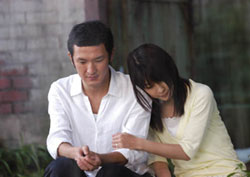|
|
|
|
|
|
|
|
Be
With You |
|
|
|
 
Shido Nakamura and Yuko Takeuchi (left) cuddle, and
(right) check out the flowers in Be With You. |
|
|
Year: |
2004 |
|
|
|
Director: |
Nobuhiro
Doi |
|
|
| |
Cast: |
Yuko
Takeuchi, Shido Nakamura, Akashi Takei, Karen Miyama,
Yosuke Asari, Yuta Hiraoka, Chihiro Otsuka, Mikako Ichikawa,
You, Suzuki Matsuo, Fumiyo Kohinata |
|
| |
The
Skinny: |
A well-told romance about a woman returning from the
grave to visit her husband and her six-year-old son.
The film requires the viewer to suspend their disbelief
to be sure, but not necessarily in terms of its far-out
premise. Even so, Be With You is a terrific little
film. |
|
|
Review by
Calvin
McMillin: |
Unlike most traditional
romances, Be With You offers up an intriguing,
possibly supernatural premise - a deceased love returning
from beyond the grave. It may sound like a pitch for
a horror movie, but Nobuhiro Doi's masterfully told
romance is anything but scary. A box office hit in Japan
and elsewhere, Be With You is a rousing crowd
pleaser, although not without its fair share of problems.
The film revolves around
a widower named Takumi (Shido Nakamura) who lives in
the country with his six-year-old son Yuji (Akashi Takei).
Both are mourning the loss of Mio (Yuko Takeuchi), beloved
wife and mother. In the wake of her death, Takumi and
Yuji have forged an odd, yet somehow functional relationship;
they act almost as if they were abandoned children forced
to take care of each other rather than actual father
and son. And as if Mio's death wasn't enough, it seems
Takumi suffers from a medical condition (Ah, another
melodramatic staple!) that affects his motor skills.
As a result, Takumi must avoid crowds and live like
a veritable recluse. Yuji is disappointed that Takumi
can't do the things that most fathers can, but turns
out to be amazingly understanding about his father's
condition. Besides, Yuji has bigger things to prepare
for - like his mother's possible return.
Strange as it may sound,
Mio made a promise on her deathbed that she would return
to Yuji and Takumi when the rainy season comes. Of course,
Takumi is skeptical of his wife's promise, but refuses
to put a damper on his son's excitement. It's clear
that Takumi, too, hopes that her dying words come true.
On the first anniversary of her death, Takumi and Yuji
wander in the woods near their house and end up meeting
a woman who is the spitting image of Mio. Strangely,
the woman possesses no memory of who she is or how she
got there. Rather than question such a providential
turn of events, father and son embrace the moment and
try to make the most of her return.
Tentatively, their family
life resumes, as Mio begins to adjust to her role as
wife and mother, re-energizing the family dynamic in
a way that brings happiness to all parties involved.
In the meantime, Takumi tries to fill in the blanks
for Mio about how they fell in love. Their backstory
is told from his perspective, as the film flashes back
to their high school days. However, his version of events
makes it clear that Takumi never became aware of Mio's
true feelings at the time, a fact that will come into
play later in the narrative.
But underlying all this
happiness is the question of how long this reunion will
last. It seems that while she was alive, Mio buried
a time capsule, one that holds the key to her startling
reappearance. Learning the truth of the situation, Mio
realizes that her days are numbered and takes steps
to ensure that Takumi and Yuji are well-taken care of
(and are able to take care of themselves) when she finally
departs this earthly plane. As the rainy season's end
approaches, all three must prepare for her eventual,
poignant departure.
Although I found Be
With You to be an engaging experience from start
to finish, it's not hard to see how some might find
fault with the film. As with most romances, it could
be accused of being a bit too sentimental and manipulative
in execution. Furthermore, a feminist critique might
focus on how Mio's importance to the family seems to
be directly related to her ability to cook, clean, and
basically take care of Yuji and Takumi. But while I
can acknowledge that these issues are present within
the film itself, I found no such problems with Be
With You. The film possesses a simple, irresistible
charm, and it's clear that its main strength lies in
the beautiful Yuko Takeuchi. She's fantastic in the
role of Mio, imbuing her character with a sense of strength,
grace, and warmth that makes her utterly convincing
as the glue that holds the family together. The film
also benefits from the performance of child actor Akashi
Takei, who plays Yuji alternatively as a young boy wise
beyond his years, yet very much as the cute child who
wants nothing more than to be reunited with his mother.
If there is one complaint
that I would lodge with the filmmakers, it would have
to be on the issue of the suspension of disbelief. Strangely,
I didn't find it hard to buy into the film's supernatural/sci-fi
premise at all, but instead found it more difficult
to buy into the fact that Mio and Takumi would ever
be a compatible couple in the first place. The two leads
share a certain kind of chemistry, but even though it's
obvious why any guy in the world would fall in love
with a girl like Mio, it's near-unfathomable to me how
Mio would be interested in a guy like Takumi. At times,
Shido Nakamura plays Takumi as an overgrown man-child.
His condition is supposed to make him an outcast of
sorts to begin with, but it's odd that when Takumi is
reunited with Mio, he appears self-conscious and uncomfortable
around her. You would think that if this is the woman
who "completes him" (pardon the Jerry Maguire
reference), then he would come out of his shell in her
presence. Certainly, his spirits are lifted by her return,
but he still acts a little strange.
In fairness to the filmmakers,
perhaps it's a double-edged sword: if Takumi seems too
capable, then Mio's importance to their lives is lessened.
But if he appears a too off-kilter, then her reasons
for falling in love with him seem wholly unbelievable.
Truth be told, the film does offer an explanation of
sorts (which I won't reveal here) for their union, but
trying to make sense of it involves certain violations
of the time-space continuum that might make your head
explode. Perhaps it would be better just to accept their
love "as is" and go from there.
Despite this criticism,
I found Be With You to be an elegantly shot,
well-drawn portrait of a family trying to make the most
of their lives on borrowed time. The finale involving
Takumi reading Mio's diary and discovering the truth
about their early days may seem tacked-on to some viewers,
especially after the emotional climax of Mio's departure,
but personally, I found the extended sequence gave the
film a deeper meaning and proved crucial to understanding
exactly what was happening in the narrative as a whole.
As such, if you simply accept the fact that these two
people were very much in love, then Be With You
should be the kind of film that should have you reaching
for the tissue box more than once. Even though I didn't
totally buy into their romance, even I found myself
moved by this beautiful, emotionally-charged film. (Calvin McMillin,
2005) |
|
|
Availability: |
DVD (HK)
Region 3 NTSC
Asia Video HK
16x9 Anamorphic Widescreen
Japanese Language Track
Dolby Digital 5.1, DTS-ES
Removable English and Chinese Subtitles
Making Of-Featurette, Behind the Scenes Footage, Trailer |
|
|
|
 |
|
|
|
images
courtesy of www.mov3.com
|
|
|
|
|
|
|
|
|
|
|
|
|
|
|
|
| LoveHKFilm.com
Copyright ©2002-2017 Ross Chen
|
|
|